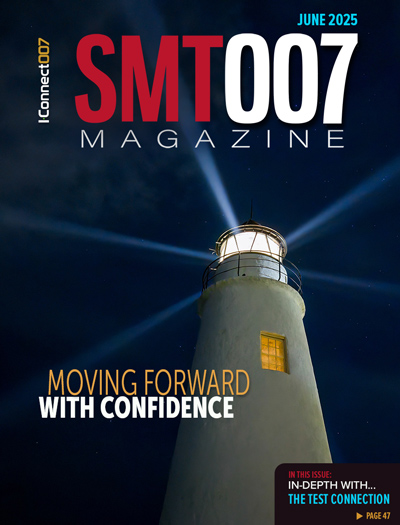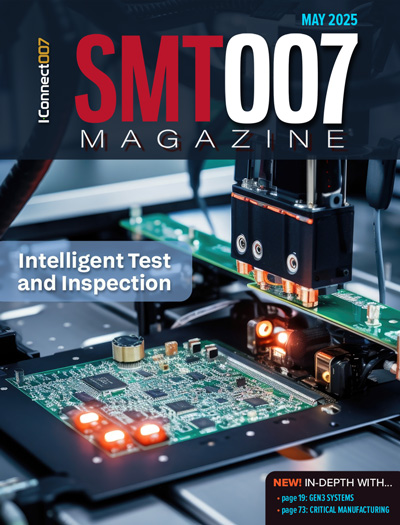-

- News
- Books
Featured Books
- smt007 Magazine
Latest Issues
Current Issue
What's Your Sweet Spot?
Are you in a niche that’s growing or shrinking? Is it time to reassess and refocus? We spotlight companies thriving by redefining or reinforcing their niche. What are their insights?

Moving Forward With Confidence
In this issue, we focus on sales and quoting, workforce training, new IPC leadership in the U.S. and Canada, the effects of tariffs, CFX standards, and much more—all designed to provide perspective as you move through the cloud bank of today's shifting economic market.

Intelligent Test and Inspection
Are you ready to explore the cutting-edge advancements shaping the electronics manufacturing industry? The May 2025 issue of SMT007 Magazine is packed with insights, innovations, and expert perspectives that you won’t want to miss.
- Articles
- Columns
- Links
- Media kit
||| MENU - smt007 Magazine
Kyocera Introduces One-Action-Lock FPC/FFC Connectors
July 19, 2023 | Business WireEstimated reading time: 1 minute
Kyocera Corporation introduced its 6893 Series connectors for flexible printed circuit board (FPC) and flexible flat cable (FFC), featuring 0.5mm-pitch one-action locking, with samples available for shipping June 29, 2023. This new series offers a 2x improvement in foreign matter removal performance compared to our previous products, helping to prevent the FPC/FFC deposits that can cause contact failure after insertion.
One-action lock type FPC/FFC connectors have evolved to meet the miniaturization and high-speed data transmission requirements of key market drivers, including office equipment, industrial equipment, and consumer electronics. Additionally, with the rapidly growing EV market, this technology has expanded into onboard electronics for electric vehicles as well.
In principle, the essential features of one-action lock-type connectors include labor savings through the automation of FPC/FFC insertion. However, in practice, foreign matter adhering to the FPC/FFC can cause contact failure, creating an obstacle to full automation. Kyocera’s newly developed 6893 series has a proprietary contact-pin structure with twice the foreign-matter removal effectiveness of conventional Kyocera products. In addition to their one-action lock, which supports automation during FPC/FFC insertion and reduces labor requirements, this product also ensures better connection performance and reliability.
Kyocera will continue to expand its connector line, including FPC/FFC connectors, and will contribute to the electronics industry by creating products for rapidly changing market needs.
Suggested Items
Lockheed Martin Revolutionizes Maritime Surveillance with AI-Powered Technology
07/21/2025 | Lockheed MartinLockheed Martin has achieved a major breakthrough in AI and airborne surveillance with the potential to detect and track maritime targets with unprecedented accuracy.
Delta Electronics (Thailand) Hosts 'Delta ESG Forum 2025' to Chart the Course for a More Sustainable and Inclusive Thailand
07/21/2025 | Delta ElectronicsDelta Electronics (Thailand) PCL., a global leader in power management and smart green solutions, today held its Delta ESG Forum 2025 under the theme “Collaborating for a Sustainable Thailand”.
NOTE’s CEO Sells 12,000 Shares – Remains as Major Shareholder
07/21/2025 | NOTENOTE's CEO Johannes Lind-Widestam has recently sold 12,000 shares in NOTE, corresponding to 3,7% of his holdings, to a value of SEK 2.3 million. The sale was carried out to cover tax obligations.
Saab Q2 2025 Results: Accelerating Growth and Strengthening our Market Position
07/21/2025 | SaabOrder intake for the second quarter amounted to SEK 28,403m (39,574), driven by strong growth in small and medium-sized orders.
SEMI Foundation Launches NSF-Powered National Call for Applicants of Regional Nodes
07/21/2025 | SEMIThe SEMI Foundation is thrilled to announce the launch of the application process for organizations seeking to become Regional Nodes in the National Network for Microelectronics Education (NNME), a nationwide initiative funded by the U.S. National Science Foundation and supported by the U.S. Department of Commerce that aims to advance education, training, and employment pathways in the U.S. microelectronics sector.


